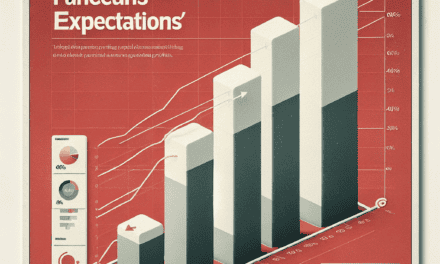“Wall Street’s Call: Palantir Rises, Alphabet Falls.”
Introduction
In recent financial analyses, Wall Street has presented a compelling narrative that suggests a shift in investment strategies concerning two major technology companies: Palantir Technologies and Alphabet Inc. As investors navigate the complexities of the stock market, the contrasting outlooks for these companies have sparked significant interest. Palantir, known for its data analytics and software solutions, has been gaining traction among analysts who see potential for growth and innovation. Conversely, Alphabet, the parent company of Google, faces scrutiny amidst regulatory challenges and market saturation concerns. This juxtaposition of buy and sell recommendations highlights the dynamic nature of the tech sector and the factors influencing investor sentiment.
Understanding Wall Street’s Shift: Why Analysts Favor Palantir Over Alphabet
In recent months, Wall Street analysts have been increasingly vocal about their shifting preferences in the tech sector, with a notable tilt towards Palantir Technologies over the long-established giant, Alphabet Inc. This shift in sentiment has sparked considerable discussion among investors and market observers, prompting a closer examination of the underlying factors driving this change. To understand why analysts are favoring Palantir over Alphabet, it is essential to delve into the strategic positioning, growth prospects, and market dynamics influencing these two companies.
Palantir, a company specializing in big data analytics and artificial intelligence, has been gaining traction due to its unique value proposition and expanding client base. The firm’s software platforms, such as Palantir Gotham and Palantir Foundry, are designed to integrate, manage, and analyze vast amounts of data, providing actionable insights for decision-makers. This capability has proven particularly appealing to government agencies and large enterprises seeking to harness the power of data to drive efficiency and innovation. As a result, Palantir has secured numerous high-profile contracts, bolstering its revenue streams and enhancing its growth outlook.
In contrast, Alphabet, the parent company of Google, has faced a series of challenges that have tempered investor enthusiasm. While Alphabet remains a dominant force in digital advertising, its core business has been subject to increasing regulatory scrutiny and competitive pressures. The rise of privacy-focused policies and ad-blocking technologies has also posed significant hurdles, potentially impacting Alphabet’s advertising revenue. Furthermore, the company’s ambitious ventures into areas such as autonomous vehicles and cloud computing, though promising, have yet to deliver substantial returns, leading to concerns about the sustainability of its growth trajectory.
Transitioning from these broader industry trends, it is important to consider the financial performance and valuation metrics that have influenced Wall Street’s perspective. Palantir’s recent earnings reports have showcased robust revenue growth, driven by both existing and new customer engagements. The company’s ability to consistently exceed market expectations has instilled confidence among analysts, who view Palantir as a high-growth opportunity with significant upside potential. Moreover, Palantir’s focus on expanding its commercial customer base, alongside its established government contracts, is seen as a strategic move to diversify its revenue sources and mitigate risks associated with reliance on public sector clients.
Conversely, Alphabet’s financial performance, while strong, has not been immune to the challenges facing the digital advertising industry. Although the company continues to generate substantial cash flow, its growth rate has shown signs of deceleration, raising questions about its ability to maintain its historical pace of expansion. Additionally, Alphabet’s valuation, often perceived as lofty, has prompted some analysts to reassess its attractiveness relative to other tech stocks with more compelling growth narratives.
In conclusion, the shift in Wall Street’s sentiment towards favoring Palantir over Alphabet can be attributed to a confluence of factors, including Palantir’s strong growth prospects, strategic positioning in the data analytics space, and successful execution of its business model. Meanwhile, Alphabet’s challenges in navigating regulatory landscapes and sustaining its growth momentum have led to a more cautious outlook. As investors weigh these considerations, the evolving dynamics between these two tech companies will undoubtedly continue to shape market perceptions and investment strategies in the months ahead.
The Rise of Palantir: Key Factors Driving Wall Street’s Buy Recommendation
In recent months, Wall Street analysts have been increasingly bullish on Palantir Technologies, a data analytics company that has captured the attention of investors with its innovative approach to big data. This enthusiasm is reflected in the growing number of buy recommendations for Palantir’s stock, a trend that stands in stark contrast to the more cautious outlook on Alphabet, the parent company of Google. Several key factors are driving Wall Street’s favorable view of Palantir, and understanding these elements provides insight into why investors are gravitating towards this company.
First and foremost, Palantir’s unique position in the data analytics sector is a significant factor contributing to its appeal. Unlike many of its competitors, Palantir has carved out a niche by focusing on complex data integration and analysis for both government and commercial clients. This specialization has allowed the company to secure high-profile contracts with entities such as the U.S. Department of Defense and major corporations across various industries. The ability to handle sensitive and intricate data sets has positioned Palantir as a trusted partner in a world increasingly driven by data-driven decision-making.
Moreover, Palantir’s business model, which emphasizes long-term partnerships and recurring revenue streams, has resonated well with investors seeking stability in an often volatile tech market. The company’s approach to client relationships, characterized by deep integration and collaboration, not only fosters customer loyalty but also ensures a steady flow of revenue. This model contrasts with the more transactional nature of many tech companies, providing Palantir with a competitive edge that is particularly attractive in uncertain economic times.
In addition to its strategic positioning and business model, Palantir’s technological advancements have also played a crucial role in garnering Wall Street’s favor. The company’s flagship platforms, Palantir Gotham and Palantir Foundry, are renowned for their ability to synthesize vast amounts of data into actionable insights. These platforms have been instrumental in addressing complex challenges, from national security to supply chain optimization, demonstrating Palantir’s capacity to deliver tangible value to its clients. As organizations continue to grapple with the complexities of big data, Palantir’s cutting-edge solutions are likely to remain in high demand.
While Palantir’s rise has been noteworthy, it is important to consider the broader context in which these developments are occurring. The tech industry is undergoing a period of transformation, with companies like Alphabet facing increased scrutiny over issues such as data privacy and regulatory compliance. This environment has led some investors to reassess their positions, opting to diversify their portfolios by exploring opportunities in emerging tech firms like Palantir. Consequently, the shift in sentiment towards Palantir can be seen as part of a larger trend of reevaluating traditional tech giants in favor of innovative newcomers.
In conclusion, Wall Street’s buy recommendation for Palantir is driven by a combination of factors, including its strategic focus on complex data analytics, a robust business model, and technological prowess. As the company continues to expand its footprint in both government and commercial sectors, it is well-positioned to capitalize on the growing demand for sophisticated data solutions. While the decision to buy Palantir and sell Alphabet may not be universally applicable, it underscores the dynamic nature of the tech industry and the importance of staying attuned to emerging trends and opportunities.
Alphabet’s Challenges: Analyzing the Sell Verdict from Wall Street
In recent months, Wall Street analysts have been closely scrutinizing the performance and future prospects of major technology companies, leading to some surprising recommendations. Among these, the suggestion to buy Palantir while selling Alphabet has sparked considerable debate among investors and market observers. To understand this verdict, it is essential to delve into the challenges facing Alphabet, the parent company of Google, and the factors influencing Wall Street’s sell recommendation.
Alphabet, a titan in the technology sector, has long been a favorite among investors due to its dominant position in search, advertising, and a suite of digital services. However, the company is currently navigating a complex landscape marked by regulatory pressures, competitive threats, and evolving consumer behaviors. One of the most significant challenges Alphabet faces is increased regulatory scrutiny. Governments worldwide are intensifying their focus on data privacy, antitrust issues, and the influence of big tech companies. This scrutiny has led to numerous investigations and legal battles, which not only drain resources but also create an atmosphere of uncertainty that can weigh heavily on stock performance.
Moreover, Alphabet’s core advertising business, which has been a reliable revenue generator, is experiencing shifts due to changes in consumer behavior and the rise of alternative platforms. The growing popularity of social media and e-commerce platforms as advertising channels is gradually eroding Google’s market share. Additionally, the increasing use of ad-blocking technologies and privacy-focused features in web browsers is impacting the effectiveness of digital advertising, prompting advertisers to seek more innovative and targeted solutions.
In contrast, Palantir, a company specializing in data analytics and software solutions, is gaining traction among investors. Palantir’s focus on providing cutting-edge data integration and analysis tools to government and commercial clients positions it well in an era where data-driven decision-making is paramount. The company’s ability to secure long-term contracts with government agencies and large enterprises provides a stable revenue stream and growth potential. Furthermore, Palantir’s emphasis on innovation and its commitment to expanding its product offerings resonate with investors looking for growth opportunities in the tech sector.
While Alphabet’s challenges are significant, it is important to note that the company’s vast resources and history of innovation provide it with the means to adapt and overcome these hurdles. Alphabet’s investments in artificial intelligence, cloud computing, and other emerging technologies demonstrate its commitment to staying at the forefront of technological advancement. However, the current market sentiment reflects a cautious approach, with investors seeking to mitigate risks associated with regulatory challenges and shifting market dynamics.
In conclusion, Wall Street’s recommendation to sell Alphabet and buy Palantir underscores the evolving landscape of the technology sector. While Alphabet grapples with regulatory pressures and changes in the advertising industry, Palantir’s focus on data analytics and its ability to secure strategic partnerships offer a compelling growth narrative. Investors must weigh these factors carefully, considering both the short-term challenges and long-term potential of these companies. As the technology sector continues to evolve, the ability to adapt and innovate will be crucial in determining which companies emerge as leaders in the years to come.
Investment Strategies: How to Navigate the Palantir and Alphabet Recommendations

In the ever-evolving landscape of investment strategies, the recent recommendations from Wall Street analysts have sparked considerable interest and debate among investors. The juxtaposition of buying Palantir Technologies and selling Alphabet Inc. presents a fascinating case study in market dynamics and investor sentiment. Understanding the rationale behind these recommendations requires a closer examination of both companies’ current positions and future prospects.
Palantir Technologies, a company specializing in big data analytics, has been gaining traction among investors due to its innovative approach to data management and analysis. The company’s software platforms, such as Palantir Gotham and Palantir Foundry, have been instrumental in providing solutions for complex data challenges across various industries, including government, healthcare, and finance. As organizations increasingly rely on data-driven decision-making, Palantir’s offerings have become more relevant, positioning the company for potential growth. Furthermore, Palantir’s recent financial performance has shown promising signs, with revenue growth and strategic partnerships bolstering investor confidence. Consequently, Wall Street’s recommendation to buy Palantir reflects optimism about its ability to capitalize on the growing demand for data analytics solutions.
In contrast, Alphabet Inc., the parent company of Google, has faced a more challenging environment. Despite its dominant position in the digital advertising space and its diverse portfolio of businesses, Alphabet has encountered headwinds that have led some analysts to recommend selling its stock. One of the primary concerns is the increasing regulatory scrutiny and antitrust investigations that Alphabet faces globally. These legal challenges could potentially impact its business operations and financial performance. Additionally, the digital advertising market, a significant revenue driver for Alphabet, is experiencing shifts as privacy concerns and changes in consumer behavior prompt advertisers to explore alternative platforms. These factors contribute to a more cautious outlook for Alphabet, prompting some investors to reassess their positions.
Transitioning from these individual company analyses, it is essential to consider broader market trends and investor strategies. The contrasting recommendations for Palantir and Alphabet highlight the importance of diversification and adaptability in investment portfolios. Investors must weigh the potential risks and rewards associated with each company, taking into account their unique market positions and external challenges. Moreover, the dynamic nature of the technology sector necessitates a forward-looking approach, as companies that can innovate and adapt to changing market conditions are more likely to succeed.
Furthermore, the recommendations underscore the significance of conducting thorough research and analysis before making investment decisions. While Wall Street analysts provide valuable insights, investors should also consider their own risk tolerance, investment goals, and time horizons. By doing so, they can make informed decisions that align with their financial objectives.
In conclusion, the divergent recommendations for Palantir and Alphabet serve as a reminder of the complexities inherent in investment strategies. As investors navigate these recommendations, they must remain vigilant and adaptable, recognizing that market conditions can change rapidly. By staying informed and considering both company-specific factors and broader market trends, investors can better position themselves to achieve their financial goals. Ultimately, the decision to buy or sell any stock should be based on a comprehensive understanding of the company’s fundamentals, market dynamics, and individual investment strategies.
Market Reactions: The Impact of Wall Street’s Verdict on Palantir and Alphabet Stocks
In recent months, Wall Street analysts have been closely scrutinizing the performance and potential of major technology companies, leading to a notable shift in sentiment towards Palantir Technologies and Alphabet Inc. This shift has sparked considerable interest among investors, as analysts have increasingly recommended buying Palantir stock while suggesting a more cautious approach towards Alphabet. Understanding the rationale behind these recommendations requires a closer examination of the factors influencing these companies’ market positions and future prospects.
Palantir Technologies, a company specializing in big data analytics, has been gaining traction due to its innovative approach to data integration and analysis. The company’s software platforms, such as Palantir Foundry and Palantir Gotham, have been instrumental in helping organizations make data-driven decisions. This capability has become increasingly valuable in a world where data is a critical asset. As a result, Palantir has secured significant contracts with government agencies and private enterprises, bolstering its revenue streams and enhancing investor confidence. Furthermore, Palantir’s strategic partnerships and expansion into new markets have positioned it as a formidable player in the tech industry, prompting analysts to issue buy recommendations.
In contrast, Alphabet Inc., the parent company of Google, has faced a more complex set of challenges. While Alphabet remains a dominant force in the digital advertising space, it has encountered regulatory scrutiny and competitive pressures that have raised concerns among investors. The company’s reliance on advertising revenue, which accounts for a substantial portion of its income, has been a point of vulnerability. As privacy regulations tighten and competitors like Amazon and Facebook continue to vie for advertising dollars, Alphabet’s growth prospects have come under question. Consequently, some analysts have advised a more cautious stance on Alphabet stock, suggesting that investors consider selling or holding rather than buying.
The divergent recommendations for Palantir and Alphabet reflect broader trends in the technology sector. As the digital landscape evolves, companies that can adapt to changing market dynamics and leverage emerging technologies are likely to thrive. Palantir’s focus on data analytics and its ability to provide actionable insights have positioned it well in this regard. Meanwhile, Alphabet’s challenges underscore the importance of diversification and innovation in maintaining a competitive edge.
Moreover, the market’s reaction to these recommendations highlights the influence of Wall Street analysts on investor behavior. When analysts issue buy or sell recommendations, they often trigger shifts in stock prices as investors adjust their portfolios accordingly. In the case of Palantir, positive analyst sentiment has contributed to upward momentum in its stock price, attracting further interest from investors seeking growth opportunities. Conversely, the cautious outlook for Alphabet has led some investors to reevaluate their positions, resulting in fluctuations in its stock performance.
In conclusion, the contrasting recommendations for Palantir and Alphabet underscore the dynamic nature of the technology sector and the critical role of Wall Street analysts in shaping market perceptions. As Palantir continues to capitalize on its strengths in data analytics and Alphabet navigates its challenges, investors will need to carefully assess the evolving landscape and consider the long-term potential of these companies. Ultimately, the verdict from Wall Street serves as a reminder of the complexities inherent in the investment world, where opportunities and risks are constantly in flux.
Future Prospects: What Wall Street’s Verdict Means for Palantir and Alphabet
In recent months, Wall Street analysts have been closely scrutinizing the future prospects of two major technology companies: Palantir Technologies and Alphabet Inc. The contrasting recommendations to buy Palantir and sell Alphabet have sparked considerable interest and debate among investors. To understand the rationale behind these recommendations, it is essential to delve into the factors influencing the market’s perception of these companies and their potential trajectories.
Palantir Technologies, a company specializing in big data analytics, has been gaining traction due to its innovative approach to data integration and analysis. The company’s software platforms, such as Palantir Foundry and Palantir Gotham, have been instrumental in helping organizations make data-driven decisions. As businesses and governments increasingly rely on data to drive their operations, Palantir’s solutions are becoming more indispensable. This growing demand for data analytics has led analysts to view Palantir as a company with significant growth potential. Moreover, Palantir’s recent expansion into new markets and its strategic partnerships with major corporations have further bolstered its prospects. Consequently, Wall Street’s recommendation to buy Palantir reflects a belief in the company’s ability to capitalize on the burgeoning data analytics market.
In contrast, Alphabet, the parent company of Google, has been facing a different set of challenges. Despite its dominant position in the search engine market and its diverse portfolio of businesses, Alphabet has encountered regulatory scrutiny and increasing competition. The company’s advertising revenue, which constitutes a significant portion of its income, has been under pressure due to changes in consumer behavior and privacy regulations. Additionally, the rise of artificial intelligence and machine learning technologies has intensified competition, with new players entering the market and challenging Alphabet’s supremacy. These factors have contributed to a more cautious outlook from analysts, leading to the recommendation to sell Alphabet shares.
Transitioning from the individual prospects of these companies, it is important to consider the broader implications of Wall Street’s verdict. The contrasting recommendations highlight a shift in investor sentiment towards companies that are perceived as agile and innovative, as opposed to those that are seen as established but potentially stagnant. This shift underscores the importance of adaptability and forward-thinking strategies in the rapidly evolving technology landscape. Companies that can effectively harness emerging technologies and address changing market demands are likely to be favored by investors.
Furthermore, the recommendations also reflect the growing emphasis on data-driven decision-making across industries. As organizations seek to leverage data to gain a competitive edge, companies like Palantir that offer robust data analytics solutions are well-positioned to benefit. On the other hand, companies like Alphabet, which are heavily reliant on traditional revenue streams, may need to diversify and innovate to maintain their market position.
In conclusion, Wall Street’s verdict on Palantir and Alphabet serves as a barometer for the evolving priorities of investors in the technology sector. While Palantir’s focus on data analytics and strategic growth initiatives have earned it a buy recommendation, Alphabet’s challenges in navigating regulatory pressures and competition have led to a more cautious outlook. As the technology landscape continues to evolve, companies that can adapt and innovate are likely to capture the attention and investment of Wall Street.
Comparing Giants: A Deep Dive into Wall Street’s Buy and Sell Recommendations for Palantir and Alphabet
In the ever-evolving landscape of technology stocks, Wall Street analysts often find themselves at the crossroads of innovation and market performance, tasked with the challenging role of guiding investors through the complexities of buy and sell recommendations. Recently, two giants of the tech world, Palantir Technologies and Alphabet Inc., have found themselves under the analytical microscope, with Wall Street offering contrasting verdicts on their investment potential. This divergence in recommendations raises intriguing questions about the factors influencing these assessments and the broader implications for investors.
Palantir Technologies, a company renowned for its data analytics platforms, has been the subject of increasing optimism among analysts. The company’s unique position in the market, driven by its ability to provide sophisticated data solutions to both government and commercial clients, has fueled a wave of buy recommendations. Analysts point to Palantir’s robust growth prospects, underpinned by its expanding client base and innovative product offerings, as key drivers of its positive outlook. Furthermore, Palantir’s strategic partnerships and investments in artificial intelligence and machine learning technologies are seen as pivotal in maintaining its competitive edge. As a result, Wall Street’s bullish stance on Palantir reflects a broader confidence in its ability to capitalize on the growing demand for data-driven insights across various sectors.
In contrast, Alphabet Inc., the parent company of Google, has faced a more cautious reception from analysts, with some recommending a sell position. Despite its dominant position in the digital advertising space and its diverse portfolio of businesses, including YouTube and Google Cloud, Alphabet’s recent performance has raised concerns. Analysts have highlighted several factors contributing to this cautious outlook, including regulatory challenges, increased competition, and potential headwinds in the advertising market. Moreover, Alphabet’s ambitious investments in emerging technologies, such as autonomous vehicles and quantum computing, while promising, also carry inherent risks that could impact its financial performance. Consequently, Wall Street’s more reserved stance on Alphabet reflects a nuanced assessment of the company’s ability to navigate these challenges while sustaining its growth trajectory.
The contrasting recommendations for Palantir and Alphabet underscore the complexities inherent in evaluating tech stocks. While Palantir’s focus on data analytics positions it well to leverage current market trends, Alphabet’s diversified business model presents both opportunities and challenges. This divergence also highlights the importance of considering both short-term market dynamics and long-term strategic positioning when making investment decisions. For investors, understanding the rationale behind these recommendations is crucial in aligning their portfolios with their risk tolerance and investment goals.
Furthermore, the broader implications of these recommendations extend beyond individual stock performance. They reflect broader trends in the tech industry, where companies are increasingly evaluated based on their ability to innovate and adapt to changing market conditions. As technology continues to reshape industries and redefine business models, the ability to anticipate and respond to these shifts becomes paramount. In this context, Wall Street’s verdicts on Palantir and Alphabet serve as a microcosm of the broader challenges and opportunities facing tech companies today.
In conclusion, the contrasting buy and sell recommendations for Palantir and Alphabet offer valuable insights into the factors shaping Wall Street’s assessments of tech stocks. By examining these recommendations, investors can gain a deeper understanding of the dynamics at play in the tech sector and make more informed decisions about their investment strategies. As the tech landscape continues to evolve, staying attuned to these insights will be essential for navigating the complexities of the market.
Q&A
1. **Question:** What is the current Wall Street sentiment on Palantir?
– **Answer:** Wall Street has shown a positive sentiment towards Palantir, with several analysts recommending it as a buy due to its strong growth prospects and expanding customer base.
2. **Question:** Why are analysts recommending buying Palantir?
– **Answer:** Analysts recommend buying Palantir because of its innovative data analytics platform, strategic government contracts, and potential for significant revenue growth.
3. **Question:** What are the concerns regarding Alphabet that have led to a sell recommendation?
– **Answer:** Concerns regarding Alphabet include regulatory pressures, slowing ad revenue growth, and increased competition in the digital advertising space.
4. **Question:** How has Palantir’s stock performance influenced Wall Street’s verdict?
– **Answer:** Palantir’s strong stock performance, driven by consistent earnings beats and strategic partnerships, has reinforced Wall Street’s positive outlook and buy recommendations.
5. **Question:** What specific factors are contributing to the sell recommendation for Alphabet?
– **Answer:** Specific factors include antitrust investigations, privacy concerns affecting ad targeting, and challenges in diversifying revenue streams beyond advertising.
6. **Question:** Are there any contrasting opinions on Alphabet’s future prospects?
– **Answer:** Yes, some analysts remain optimistic about Alphabet’s future, citing its investments in AI, cloud computing, and other innovative technologies as potential growth drivers.
7. **Question:** How do market trends impact the buy recommendation for Palantir?
– **Answer:** Market trends favoring big data and analytics, along with increased demand for data-driven decision-making, support the buy recommendation for Palantir as it is well-positioned to capitalize on these trends.
Conclusion
Wall Street’s verdict to buy Palantir and sell Alphabet reflects a shifting sentiment among investors, driven by differing growth prospects and market dynamics for the two companies. Palantir, with its focus on data analytics and government contracts, is perceived as having strong potential for future growth, especially as data-driven decision-making becomes increasingly critical across industries. On the other hand, Alphabet, despite its dominant position in digital advertising and technology, faces challenges such as regulatory scrutiny, market saturation, and competition, which may impact its growth trajectory. This divergence in investor sentiment underscores the importance of evaluating companies based on their unique market positions, growth opportunities, and potential risks.





